- Home
- Mark Pryor
Hollow Man
Hollow Man Read online
ALSO BY MARK PRYOR
The Bookseller
The Crypt Thief
The Blood Promise
The Button Man
The Reluctant Matador
Published 2015 by Seventh Street Books®, an imprint of Prometheus Books
Hollow Man. Copyright © 2015 by Mark Pryor. All rights reserved. No part of this publication may be reproduced, stored in a retrieval system, or transmitted in any form or by any means, digital, electronic, mechanical, photocopying, recording, or otherwise, or conveyed via the Internet or a website without prior written permission of the publisher, except in the case of brief quotations embodied in critical articles and reviews.
Cover image © Matthew Heptinstall
Cover design by Jacqueline Nasso Cooke
Excerpts from “The Hollow Men” from Collected Poems 1909–1962 by T. S. Eliot. Copyright 1936 by Houghton Mifflin Harcourt Publishing Company. Copyright © renewed 1964 by Thomas Stearns Eliot. Reprinted by permission of Houghton Mifflin Harcourt Publishing Company. All rights reserved.
Extract taken from “The Hollow Men,” taken from Complete Poems and Plays © Estate of T. S. Eliot and reprinted by permission of Faber and Faber Ltd.
This is a work of fiction. Characters, organizations, products, locales, and events portrayed in this novel either are products of the author's imagination or are used fictitiously.
Inquiries should be addressed to
Seventh Street Books
59 John Glenn Drive
Amherst, New York 14228
VOICE: 716–691–0133
FAX: 716–691–0137
WWW.SEVENTHSTREETBOOKS.COM
19 18 17 16 15 5 4 3 2 1
The Library of Congress has cataloged the printed edition as follows:
Pryor, Mark, 1967-
Hollow man / by Mark Pryor.
pages ; cm
ISBN 978-1-63388-086-3 (pbk.) — ISBN 978-1-63388-087-0 (ebook)
1. Psychological fiction. I. Title.
PS3616.R976H65 2015
813'.6—dc23
2015011552
Printed in the United States of America
Chapter One | Cactus Land
Chapter Two | The Prickly Pear
Chapter Three | Shape without Form
Chapter Four | The Twinkle of a Fading Star
Chapter Five | Eyes I Dare Not Meet
Chapter Six | Here Are the Stone Images
Chapter Seven | Our Dried Voices
Chapter Eight | Those Who Have Crossed
Chapter Nine | A Tree Swinging
Chapter Ten | The Tumid River
Chapter Eleven | Of Meeting Places
Chapter Twelve | Trembling with Tenderness
Chapter Thirteen | Over Broken Glass
Chapter Fourteen | From Prayers to Broken Stone
Chapter Fifteen | Lips That Would Kiss
Chapter Sixteen | Filled with Straw
Chapter Seventeen | The Stuffed Men
Chapter Eighteen | In Our Dry Cellar
Chapter Nineteen | Shade without Color
Chapter Twenty | Gesture without Motion
Chapter Twenty-One | In the Wind's Singing
Chapter Twenty-Two | On a Broken Column
Chapter Twenty-Three | With Direct Eyes
Chapter Twenty-Four | Distant and More Solemn
Chapter Twenty-Five | Behaving as the Wind
Chapter Twenty-Six | This Is the Way the World Ends
Chapter Twenty-Seven | Deliberate Disguises
Chapter Twenty-Eight | Death's Twilight Kingdom
Chapter Twenty-Nine | We Whisper Together
Chapter Thirty | In This Hollow Valley
Chapter Thirty-One | Of Empty Men
Chapter Thirty-Two | Falls the Shadow
Chapter Thirty-Three | Wind in Dry Grass
Chapter Thirty-Four | Not with a Bang but with a Whimper
Acknowledgments
About the Author
“Those who have crossed
With direct eyes, to death's other kingdom
Remember us—if at all—not as lost
Violent souls, but only
As the hollow men…”
—“The Hollow Men” by T. S. Eliot
My parents’ lawyer called with the news as I climbed out of my car, our conversation a hesitant hopscotch of words until we caught up to the slight delay that comes with international calls. His voice seemed thinned out by the distance between us, me in a downtown garage in Austin, Texas, him in his small village in England.
Or perhaps the quaver in his voice came from what he had to tell me. The news, of course, wasn't good. People don't make long-distance calls to strangers for anything but the bad, and so he cleared his plummy little throat and told me that my parents were dead. Killed yesterday, on the family farm.
“I'm frightfully sorry,” he said.
I thought at first he must be joking, or mistaken. But English solicitors don't play cruel practical jokes, and they certainly don't make mistakes like this. Which meant that my mum and dad, both of them, were really dead and had been since yesterday. Dead when I went to bed last night, dead when I got up this morning, dead when I was deciding how many tacos I wanted for breakfast. I didn't know what to say, and when I tried to speak, nothing but a croaking came out, so I stayed silent.
“There was a big storm,” he explained. “The next morning your parents went for a walk to see if there was any damage, trees blown over, that sort of thing. Your father stepped on a downed power line.” My mum, he said, raced over to help without realizing what had happened, and reached for her husband's hand one last time.
“I'm sorry,” he said again, “I'm sure this is quite a…” He couldn't very well say shock, but it was the right word.
“Thank you for letting me know,” I said. I closed my car door behind me and kept the phone to my ear.
“You're probably wondering about…the farm, all the practical stuff.”
I wasn't, of course. I was struggling to bring up a clear picture of my parents. It's a funny thing that when you've not seen people for a decade, even people you love and who love you, their faces seem to quiver in your mind, blurring in and out. I stood there in the garage, a block of sunlight creeping toward my toes, and I simply couldn't bring up a clear image of them.
But Craig Whitfield, Esquire, didn't know that. He was like so many English people of his generation and class: welcoming the busy necessities so they could blanket those awkward emotions that one was supposed to experience weakly, and express not at all.
“Not the best news there, either, I'm afraid,” he was saying. “You see, farming isn't what it was twenty years ago. The new, open Europe has been good for everyone except farmers—can't compete, and the subsidies are a fraction of what they used to be. As a result, I'm afraid your father picked up a spot of debt along the way. More than a spot, quite frankly. The land is worth something, but some of the larger fields he'd already sold off and was leasing back.”
“Oh, I didn't know that.” I didn't know that because I hadn't spoken to my parents in many years.
“I'm the executor of the will, so I'll have more information in a week or so, once everything's tallied up.”
“What about the funeral arrangements?”
“They didn't want one. You know them—they weren't religious in any way and didn't believe in making a fuss over the dead. They have identical wills, which say they want to be cremated and their ashes spread in the back meadow. No service, no memorial.”
Just gone.
My mind held a picture of them now, a little fuzzy but safely created and tucked away, high on a shelf but visible for when I wanted to see it. My father thin and weathered, an unruly flop of hair his only departure from a l
ife of order and logic. My mother just as wiry, a pretty lady when she made the effort, but a woman of the country, just as hardy and ready to work as her husband.
I struggled for something to say, wondering what I ought to say to a stuffy English solicitor bearing bad tidings. I didn't really know even though my mind was working overtime, processing all he'd told me, but I knew that I didn't want this call to end, not yet. It couldn't end because then I'd be left holding a phone in the gathering heat of a Texas summer morning, and everything would be the same as yesterday, except my parents would be dead. This moment, this call, it was too brief to herald the obliteration of the people who'd conceived, raised, and eventually exiled me.
But I had nothing to ask. I knew how they'd died, and I knew the farm would disappear into the debt hole they'd created; and with them and it gone, all connections were severed. Just a final “tally up” from Craig Whitfield, Esquire, probably no more than an e-mail letting me know precisely how worthless my inheritance was.
“Right,” I said. “No funeral. That makes sense for them, I guess. Do I need to come over there for anything?”
“No,” he said, a little too hurriedly. “I'll spread their ashes, it's what they wanted. I'll take care of all the paperwork, the legal mumbo-jumbo, and send you a copy of the wills. Like I said, I don't know that there'll be much—we'll have to have an estate sale to take care of the bills. There's a guitar, though, your dad's old one that he wanted you to have. You play?”
“I do. Prosecutor by day, musician by night.”
“Splendid. You'll appreciate the guitar, then.”
“Absolutely. Thanks again.” I stood there in the shadows of the garage, the stale smell of urine and dust coming into focus as Mr. Whitfield's presence receded.
“Yes, you're very welcome.” His voice softened, as if emotion was allowed after all, or a measure of sympathy anyway. “And my condolences, Dominic, it's all quite a shame.”
Indeed. My parents had been electrocuted to death, and even though I'd not seen them in a long time, they'd finally abandoned me permanently, irrevocably, taking into oblivion with them the house I'd been born in, the fields I'd played in, and the woods I'd explored for my most formative years. So yes, at that moment I tended to agree with Craig Whitfield, Esquire, that it was all quite a shame.
I put the phone in my pocket and stared out into the sunlight, perched on the hood of my car, wondering whether to go home, go to England, or do what my parents would have done: carry on with a stiff upper lip. They'd done that after I left, got on with their lives while allowing for the occasional parental exploit, a Christmas or birthday card. Eventually, like the missives from a senile grandparent, the cards stopped arriving. I didn't mind as much as I ought to have, just because I knew what my parents were like and I knew that day would come. It wasn't born of callousness, either, just practicality. Logic. What would an estranged son want with a birthday card from someone he's not seen in years? Exiling me wasn't an act of callousness, either, though it's easy to see it that way, pitch it as one. As much as anything, it was a way of saving me from something I'd done, something that could have had much worse consequences than a new life in America.
It happened when I was sixteen years old, on a foggy morning in the English village of Weston, when I mistook the florid features of a local man for a rising pheasant and shot him in the face.
The man died the next day, and as usual I thought I could atone for my misdeed by writing a song. My family called me cold-blooded, and when I tried to explain some of the things the man had done, they wouldn't listen, they didn't care, as if death erased the man's own misdeeds. It wasn't the first time they'd failed to believe me, but it was the most serious, and the last. Instead of writing my song, I was shipped to wealthy and disinterested relatives in Texas. There, I lived out my youth in a military school where I hung on to my accent for dear life and carried a guitar everywhere I went. I stayed in Texas when I graduated and my most prized possession remained my guitar, but I quickly bought a gun and loved it enough to make my guitar sing with jealousy. It was a semiautomatic Smith & Wesson, sexy but not as beautiful as the antique Purdey shotguns I'd left behind in England. The shotguns. When I was on the phone with the lawyer, I'd wanted to ask for them, ask him what would become of them. But the thought seemed crass. Hell, maybe my father already sold them, after what happened.
In all other ways, and as I've done ever since I came to America and came to know myself, I donned the local camouflage and learned to fit in: I kicked my car door closed with a cowboy boot every day and strolled into work with a breakfast taco in each hand. After a few years, I thought I was free and clear of my tragic past but, as they say, accidents happen in threes.
The first one came with that pull of a trigger and exiled me to Texas. The second one was a slower kind of disaster that hid itself inside a normal Thursday, a day that started out like any other. A slow-burn disaster that, step by step, twisted my future out of trajectory. Not as quickly as the blast of a gun but in a way that, much later, made me think I should have seen it coming.
A car passed me, adding its fumes to the rancid air in the garage, and I wanted out of there. Not to go home, I didn't need to spend the day in maudlin reverie. Nor was I needed in England. I'd do what I could to honor my parents and behave the way they'd hope for, the way they'd behave and expect me to. I'd go to work.
I opened the front door and retrieved my 9mm from the glove compartment and tucked it into its cloth bag. A second wave of oil and piss hit me, and I held my breath while I locked my gun and guitar in the trunk, as I did every day. This garage was for county employees only, but defendants at the neighboring courthouse used it without compunction, which should have surprised no one, but seemed to. As a result, I threw furtive looks over my shoulder as I stashed the guitar case and felt that daily twinge of hope it'd be there when I finished work. I'd asked to have cameras put up in the garage (I had a thing for cameras and surveillance, having won some of my biggest trials because critical moments were caught on tape), but neither the county nor the city wanted to pay for them.
They went everywhere with me, the gun and the guitar, everywhere except the office. Even though I prosecuted murderers and rapists for a living, my boss had seen fit to ban us from packing heat while at work. Our offices were in the same building as the courts, so he was right that the place was stuffed to the gills with cops and sheriffs but, for an Englishman living in Texas, not being allowed to carry my sidearm was a grave disappointment.
I took the stairs to exit the parking deck, having learned my lesson about the unreliable lift on two separate occasions. To my right sat a small park, a hollow of dead grass and bare earth with a surrounding ribbon of sidewalk that guided men and women in suits toward the criminal courthouse. Sitting catty-corner to the courts, the park was littered with the unmoving bodies of the homeless, a dozen or more lying still in the gathering heat. It was the first of July, and soon these men, and a few women, would rise like zombies to begin the daily ritual of plodding across the worn, brown grass to their favorite tree to bag space for the day. As the sun rose and normal people sought shelter in air-conditioned offices and malls, these people shuffled their packs and ragged bodies, creeping in tiny circles like the shadows of a sundial in their attempts to stay cool.
I stood in the shade of the parking lot and watched, something I often did. Had always done. My best friend back home had once come across me—I think I was about nine years old—sitting in a tree in the school playground. My back to the trunk, legs dangling as I watched my classmates roam around beneath me. He'd likened me to a leopard, alert, solitary, a cat of prey sitting high on my branch while the world passed by.
A chorus of voices drew my attention to a row of colorful media trucks that lined the curb around the courthouse plaza, their engines humming in anticipation of action, antennas spiking from their roofs and wires spilling from their sides. The reporters, called talent for no reason I could figure out, were gett
ing ready for the morning's live broadcast, coiffing their hair and powdering their noses. A quick scan showed they were all male.
I moved toward the news vans, and when I got close, I spotted Patrick Stephens. He'd covered my last murder trial and given me some airtime when the jury came back with a guilty verdict. I liked him more than the other reporters who, with their serious faces and fake importance, were like car salesmen always looking for an angle. Not Patrick. He was like a friendly Irishman who'd buy you pints at the pub and expect nothing in return except a joke or two. He was red-haired, roly-poly, twinkly-eyed, and the only person I knew who looked ten pounds lighter on camera.
“Hey, it's Dominic, the musical British prosecutor,” he said. “You look frowny, what's wrong?”
“You know, the usual. Shitty news arrives early in the morning just so it can screw up your whole day.”
“That's why we have a morning show,” he grinned. “Care to unload on a friend?”
“When I find one, I will.” My smile was supposed to be friendly, to show I was joking, but I expect it looked as insincere as it felt. “Also, I'm a musician, not musical. And I'm English, not British. How would you like me to call you Canadian?”
“Just fine. I'm from Ottawa.”
“I feel like I should know that. Eh?”
“Hilarious. But I've been in Texas ten years, so don't sweat it.” He interrupted a stroke of his comb to look over at the growing crowd.
“Why are you chaps here?” I asked.
“Covering the Wilbert trial,” he said. “Closing arguments today. Should be good.”
“Yeah, any time a kid gets stabbed it's awesome.”
The Wilbert trial. The man looked like a librarian but had stabbed his ex-girlfriend thirty-six times with a knife he took from her kitchen. When her five-year-old ran screaming to his momma's side, Wilbert stabbed him four times. Momma died at the scene, but the boy lived, which, if nothing else, seemed like poor planning. Leaving a witness, and all.
“You know what I mean.” He poked me in the chest with his comb. “And don't act all high and mighty—we both make money from other people's tragedies.”

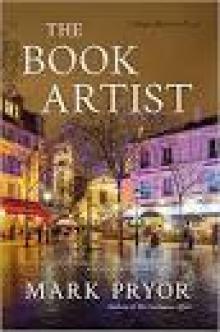 The Book Artist
The Book Artist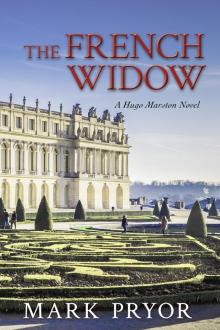 The French Widow
The French Widow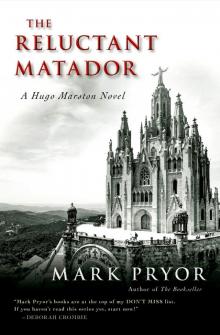 Hugo Marston 04 - The Reluctant Matador
Hugo Marston 04 - The Reluctant Matador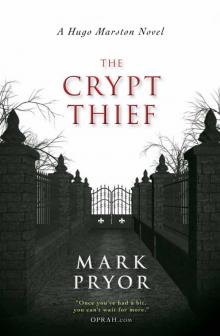 The Crypt Thief
The Crypt Thief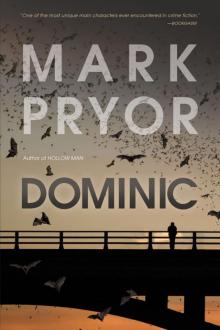 Dominic
Dominic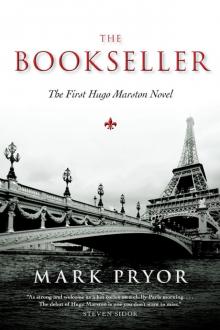 The Bookseller
The Bookseller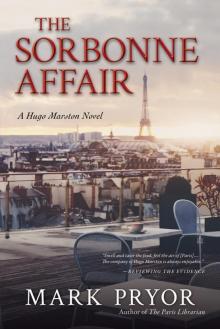 The Sorbonne Affair
The Sorbonne Affair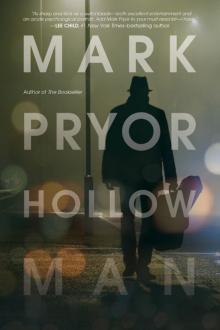 Hollow Man
Hollow Man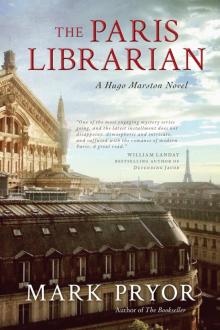 The Paris Librarian
The Paris Librarian